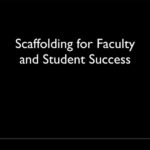Assignments
How to Write Compelling Final Project Prompts

A good final project incorporates everything the student has learned in the course. It lends structure and meaning to the assignments that precede it, and it offers the student a chance to demonstrate mastery of course material in a way that is authentic to the subject matter. In an introductory nutrition course, for example, a good final project might ask students to complete an educational flyer or develop a blueprint for a blog. Both of these assignments help students cultivate skills they will use in the discipline.
A bad final project is unrelated to course material. It fails to provide context; that is, it does not explain why students should complete the project besides simply fulfilling a course requirement. It asks students to complete rote, uninspiring work. It does not engage or inspire; it requires only a dreary slog to the finish line.
Writing Great Assignment Instructions: Tips for Success

The development of creative, authentic assignments that align with course objectives is always an exciting process. However, guiding students with clearly written assignment instructions can be challenging.
We owe it to our busy online students to provide clear, concise instructions that prepare them for success. This week’s blog will provide some tips to help you to do just that.
Creating Effective Writing Assignments: The Discourse Community Framework

Using the writing process – often a complex, messy and mysterious process for students – is crucial for graduate-level success.
Students not only need to grapple with understanding course concepts, but they must also be able to express them professionally and intelligently.
Well-designed writing prompts, with the addition of writing support, can provide the extra guidance many students need.
Writing Discussion Forum Prompts

Tips for Improving Paragraph Integrity

People often talk about personal integrity, but what about paragraph integrity?
An essential part of clear prose, paragraph integrity means each sentence within a paragraph follows from the one that came before. Oftentimes a piece of writing is unclear because it lacks paragraph integrity.

Assignment Scaffolding for Faculty and Student Success – A Recorded Webinar
It’s all in How You Ask – Posing Questions to Engage Learners

Good questions require thought and careful word choices.
TYPES OF QUESTIONS
In their simplest form, there are two very basic categories of questions: closed-ended questions and open-ended questions. Each question type has a place in education as well as its own benefits and drawbacks.
A closed-ended question can be answered with a simple one-word answer (i.e. Good, yes, no, blue, 42) or a very specific answer. Closed questions are typically less stimulating than an open-ended question. These tend to be questions that ask the responder to recall a fact or choose from a selection of answers. The answer is typically correct or incorrect, with little room for ambiguity.